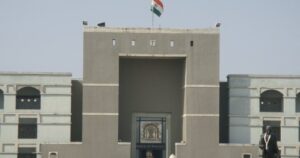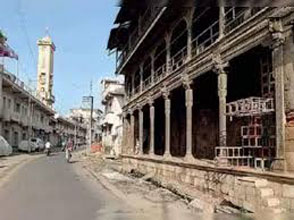AHMEDABAD, JAN 21
The Gujarat High Court on Wednesday issued a notice to the state government on a plea challenging certain provisions of a law that is meant to prevent the distressed sale of property in communally sensitive areas and restrained it from issuing a notification under them till next hearing.

A division bench of Chief Justice Vikram Nath and Justice AJ Shastri issued the notice to the government on the plea related to certain provisions of the Disturbed Areas (Amendment) Act, 2020, and fixed the next hearing on February 3.
“Ms Luvkumar (government pleader) upon instructions has informed that as of date, the notification under section 3(1)(ii)(iii) of the Amending Act, 2020, has still not been issued, and is at the stage of the assent of the Governor.
“Till the next date fixed, the respondent state is restrained from issuing any notification under the above provisions,” the court said.
The Gujarat Prohibition of Transfer of Immovable Properties and Provision for Tenants from Eviction from Premises in the Disturbed Areas (Amendment) Act, 2020 violates Articles 14, 19, 21, constitutional morality, and the basic features of the Constitution, said the plea moved by Jamiat Ulama-e-Hind.
“The 1991 Act, as amended by the 2020 Amendment Act, gives legal imprimatur to further entrench and codify the segregation between communities.
“Accordingly, Muslims and other minorities of Gujarat who are already ghettoised will be further marginalised and segregated under the said legal sanction,” the plea said.
The petition said the amended Act desires to compartmentalise communities based on the so-called ”common traits”.
It introduces the concept of identification of proper clustering of persons of one community based on traits of residents of a particular geographical area having common norms, religion, values or identity and sharing a sense of place in the said area, it said.
The criteria laid down by the government to declare an area as disturbed under the Act “are vague, uncertain and basically opposed to the constitutional values of equality, liberty, and fraternity,” the plea said.
The Act denies equality of status and opportunity to marginalised communities who will be forced to live in ghettos which will hamper their overall development, the petition said.
Consequently, the Act breeds social and economic injustice against marginalised sections of the society, it said.
The Act restricts the sale of property by members of one religious community to those from another community without the prior approval of the district collector in areas declared as disturbed”.
To stop people from acquiring properties in disturbed areas through illegal means, the Act proposes imprisonment between three to five years along with a fine of Rs 1 lakh or 10 percent of the value of the property, whichever is higher.
As per the new provisions, the word transfer now includes the sale, gift, exchange, lease, or taking possession of the property by way of power of attorney.
Under the amended Act, the collector can now check if there is any likelihood of polarisation, disturbance in demographic equilibrium, or any likelihood of improper clustering of persons of a community if property transfer takes place.
The collector can reject the application of property transfer after assessing these grounds.












